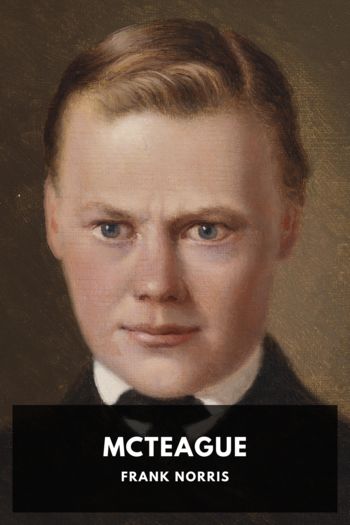McTeague, Frank Norris [polar express read aloud .txt] 📗

- Author: Frank Norris
Book online «McTeague, Frank Norris [polar express read aloud .txt] 📗». Author Frank Norris
Maria paused, shaking her head, thinking over the vanished splendor. Illiterate enough, unimaginative enough on all other subjects, her distorted wits called up this picture with marvellous distinctness. It was plain she saw the plate clearly. Her description was accurate, was almost eloquent.
Did that wonderful service of gold plate ever exist outside of her diseased imagination? Was Maria actually remembering some reality of a childhood of barbaric luxury? Were her parents at one time possessed of an incalculable fortune derived from some Central American coffee plantation, a fortune long since confiscated by armies of insurrectionists, or squandered in the support of revolutionary governments?
It was not impossible. Of Maria Macapa’s past prior to the time of her appearance at the “flat” absolutely nothing could be learned. She suddenly appeared from the unknown, a strange woman of a mixed race, sane on all subjects but that of the famous service of gold plate; but unusual, complex, mysterious, even at her best.
But what misery Zerkow endured as he listened to her tale! For he chose to believe it, forced himself to believe it, lashed and harassed by a pitiless greed that checked at no tale of treasure, however preposterous. The story ravished him with delight. He was near someone who had possessed this wealth. He saw someone who had seen this pile of gold. He seemed near it; it was there, somewhere close by, under his eyes, under his fingers; it was red, gleaming, ponderous. He gazed about him wildly; nothing, nothing but the sordid junk shop and the rust-corroded tins. What exasperation, what positive misery, to be so near to it and yet to know that it was irrevocably, irretrievably lost! A spasm of anguish passed through him. He gnawed at his bloodless lips, at the hopelessness of it, the rage, the fury of it.
“Go on, go on,” he whispered; “let’s have it all over again. Polished like a mirror, hey, and heavy? Yes, I know, I know. A punch-bowl worth a fortune. Ah! and you saw it, you had it all!”
Maria rose to go. Zerkow accompanied her to the door, urging another drink upon her.
“Come again, come again,” he croaked. “Don’t wait till you’ve got junk; come any time you feel like it, and tell me more about the plate.”
He followed her a step down the alley.
“How much do you think it was worth?” he inquired, anxiously.
“Oh, a million dollars,” answered Maria, vaguely.
When Maria had gone, Zerkow returned to the back room of the shop, and stood in front of the alcohol stove, looking down into his cold dinner, preoccupied, thoughtful.
“A million dollars,” he muttered in his rasping, guttural whisper, his fingertips wandering over his thin, cat-like lips. “A golden service worth a million dollars; a punchbowl worth a fortune; red gold plates, heaps and piles. God!”
IVThe days passed. McTeague had finished the operation on Trina’s teeth. She did not come any more to the Parlors. Matters had readjusted themselves a little between the two during the last sittings. Trina yet stood upon her reserve, and McTeague still felt himself shambling and ungainly in her presence; but that constraint and embarrassment that had followed upon McTeague’s blundering declaration broke up little by little. In spite of themselves they were gradually resuming the same relative positions they had occupied when they had first met.
But McTeague suffered miserably for all that. He never would have Trina, he saw that clearly. She was too good for him; too delicate, too refined, too prettily made for him, who was so coarse, so enormous, so stupid. She was for someone else—Marcus, no doubt—or at least for some finer-grained man. She should have gone to some other dentist; the young fellow on the corner, for instance, the poser, the rider of bicycles, the courser of greyhounds. McTeague began to loathe and to envy this fellow. He spied upon him going in and out of his office, and noted his salmon-pink neckties and his astonishing waistcoats.
One Sunday, a few days after Trina’s last sitting, McTeague met Marcus Schouler at his table in the car conductors’ coffee-joint, next to the harness shop.
“What you got to do this afternoon, Mac?” inquired the other, as they ate their suet pudding.
“Nothing, nothing,” replied McTeague, shaking his head. His mouth was full of pudding. It made him warm to eat, and little beads of perspiration stood across the bridge of his nose. He looked forward to an afternoon passed in his operating chair as usual. On leaving his Parlors he had put ten cents into his pitcher and had left it at Frenna’s to be filled.
“What do you say we take a walk, huh?” said Marcus. “Ah, that’s the thing—a walk, a long walk, by damn! It’ll be outa sight. I got to take three or four of the dogs out for exercise, anyhow. Old Grannis thinks they need ut. We’ll walk out to the Presidio.”
Of late it had become the custom of the two friends to take long walks from time to time. On holidays and on those Sunday afternoons when Marcus was not absent with the Sieppes they went out together, sometimes to the park, sometimes to the Presidio, sometimes even across the bay.





Comments (0)